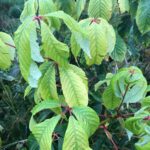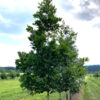Ilex decidua, commonly called possumhaw, is one of several species of the vast Ilex genus native to North America. Unlike many members of the genus, it is deciduous. Possumhaw is generally a southeastern species, with a native range extending from the Hill County of Texas, north to central Missouri, and east to central Virginia. It is rarely found in the Appalachians, but is fairly common east and south of the Fall Line, excluding coastal areas except in Alabama and northwest Florida.
As with many of the North American native deciduous hollies, it is tolerant of moist soils and most frequently appears in floodplains and margins of swamps or ponds at elevations up to about 350 m (1150 ft). It also can be found occupying limestone glades and bluffs, along streams in wet woods, and in lowland valleys. In the wild, it often associates with water tupelo (Nyssa aquatica), overcup oak (Quercus lyrata), baldcypress (Taxodium distichum), hackberry (Celtis spp.), and sycamore (Platanus occidentalis). Tolerant of both full sun and partial shade, Ilex decidua can vary considerably in habit, from a dense, twiggy, rounded, multi-stemmed shrub up to 6-10 ft high and across in sun to an irregular, open small tree of 25 ft in shadier situations.
[Article continues below photos.]
Possumhaw features dark green, narrow, oblong leaves, with finely-toothed margins. There is no appreciable fall color. Stems and twigs are medium brown when young, maturing to a light grey. A profusion of small, creamy flowers are produced in early spring. As with many hollies, male and female flowers are produced on separate plants. The female flowers, when pollinated, produce numerous small (<½”) berry-like fruits which mature to a bright red-orange.
In the landscape, the dense, twiggy nature of the plant allows it to serve as an effective screen, even in months when no foliage is present. The lower branches can also be pruned to form a tidy small tree with a tight crown. Due to its small stature and high tolerance for pruning, it is a versatile native useful in many landscape settings from border to hedgerow to specimen, and is especially well-suited to backyard gardens. Possumhaw’s tolerance for moist (not saturated) soils also makes it an excellent choice to stabilize streambanks and bioswales. The bright red-orange fruit provides winter interest in the garden and, after repeated freeze/thaw cycles, becomes attractive as a late-winter food source for many species of songbirds — and opossums (Didelphis virginiana) — as the common name implies. Ilex decidua is also mostly pest-free in the landscape, with leaf spot and powdery mildew occasionally an issue in humid weather. The young twigs can also be attractive to browsing white-tailed deer (Odocoileus virginianus).
Ilex decidua is offered by White House Natives in 3 ft to 6 ft sizes. Order now for your next project!





![At the Nursery: Budding Out [Part 3]](https://whitehousenatives.com/wp-content/uploads/2024/04/Carpinus-caroliniana-catkins-100x100.jpg)
![At the Nursery: Budding Out [Part 2]](https://whitehousenatives.com/wp-content/uploads/2024/04/Acer-rubrum-seed-pods-100x100.jpg)
![At the Nursery: Budding Out [Part 1]](https://whitehousenatives.com/wp-content/uploads/2024/04/Liriodendron-tulipifera-leaf-out-100x100.jpg)